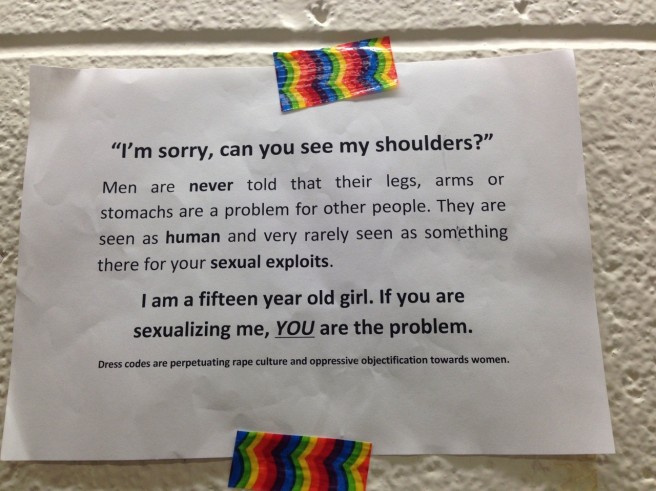Moving Forward with the Sex Positivity Movement

Posted by Samaria
October 30, 2014
 via numberonesugarbaby.tumblr.com/
via numberonesugarbaby.tumblr.com/
The sex positivity movement that has emerged in the last few years has made amazing efforts in challenging sexist and misogynist attitudes about women’s sexual expressions, everyday behaviors, the clothes women wear, and the like. For every magazine article that sounds off about Millennial women’s alleged narcissism and labels us the #selfie generation, there are thousands of girls flooding Tumblr and Instagram at any given moment, discovering how to love themselves through the creation and recreation of images they have total control over. (Note that while Time‘s article was about the generation as a whole, Time chose a tween girl with her phone for its cover.)
Sex positivity gives girls the space to stand up against predatory male teachers who complain about them wearing bra straps and yoga pants, and instead of praising the students who confront the sexualization of their bodies without consent, not realizing that later on that’ll give them courage to fight against male coworkers who sexually harass them in the office, too many of us feel the need to shame those same girls for “distracting” their male classmates from their schoolwork, as if those girls don’t deserve to move through the hallways without worrying about the potential humiliation from adults. And I thank every Laci Green and Heather Corinna in the world who teach the sex ed that young people deserve, who treat sexuality as something to be enjoyed and handled with respect, compassion, and honesty.
But I think the sexual positivity misses the mark sometimes. I think those of us who’re part of it too often allow the sex positivity movement to cross boundaries it shouldn’t. We often fail to recognize how sex positivity might not actually be all that positive for some of us. The sex positivity movement consistently overlooks survivors of sexual assault and the asexual community, for instance, in dialogues about healthy sexuality and how that may be freely, but safely, expressed. I’ve had the privilege of being welcomed into a conversation where assault survivors and asexual acquaintances shared their insight about this particular problem, and here is what I learned from them:
For survivors of sexual violence, the sex positivity movement simply fails to account for how sexual assault affects the sexual relationships that follow it. In the pressure to embrace one’s sexuality, those of us who strongly advocate for sex positivity fail to realize that sex for some might be a corrupted thing, something to be ashamed of. We overlook how even platonic and familial touches can be triggering; we lack the patience and quietly dismiss how survivors’ relationships with their own bodies might go hand in hand with disassociation and self-harm. When that happens, sex positivity is something toxic – we don’t allow survivors to heal, to come to terms with sex and bodies in their own way and at their own pace. We fault the ones who’re brave enough to admit that sex scares them, that sex might or will never again be a good thing for them.
And on that same note, the sex positivity movement almost always excludes the asexual community completely. It might seem counterintuitive, speaking about sex positivity and asexuality in the same breath, but sex positivity is supposed to be about creating a society that values the diversity of sexual expressions and working toward a world where every decision about sexual expression is respected. “Every decision” needs to include the decision not to have sex, point blank, without demanding justification for that decision or even questioning asexuality itself.
The sexual justice community, whether or not we as individuals consider ourselves part of the sex-positivity movement, need to be more careful in our discussions about consent and more willing to let those conversations get ugly if that means all of us come to a more comprehensive understanding of sex positivity and sexual justice. If we’re willing to work through the thorny gray areas of sex positivity as it relates to the asexual community, like what consent might look like for an asexual person in a relationship with someone who isn’t, then we’ll be able to move forward with a far more comprehensive understanding of what sex positivity and sexual justice truly are.
The sex positivity movement has been a godsend in a lot of ways, but it isn’t perfect by any means. For survivors of sexual assault and the asexual community, as well as those with other marginalized identities for whom sexual expression and self-agency aren’t necessarily mutually accessible to them (see Slutwalk’s tension with black women), the movement is often a reminder of exactly how negative sexuality can be. That’s not to say that the sex positivity movement ought to be abandoned; I don’t believe that it should. It does, however, need an honest (re)evaluation of its priorities, its goals, and those the movement seeks to help and benefit.
Leave a Reply
You must be logged in to post a comment.

